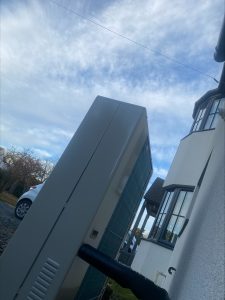Do Heat Pumps work in winter?
Thousands of heat pump systems have been installed for many years in some of the coldest parts of the world. In fact, Norway is leading the European heat pump race with 1.4 million units installed in 2020, 604 heat pumps installed in every 1000 homes. This has resulted in total energy savings of 10 TWh , which is enough energy to make 368 trips to the moon. The fact that Nordic countries, known for their harsh winters, are among the biggest users, disprove the myth that this heating technology does not work when the temperatures plummet. Learn more about Heat Pumps in Europe>
The key to a Heat Pump’s success is the detailed design and specification process that ensures the system can produce enough energy even on the coldest days. An Air Source and Ground Source Heat Pump systems work in a similar method to refrigerators, except in reverse. Air Source Heat Pumps can extract heat from the air, even when temperatures are as low at -15 degrees centigrade. The ground stays at a relatively constant temperature throughout the year so Ground Source Heat Pumps can work all year round.
“These renewable heating systems are still more efficient and greener than other options”, experts say.
How do you look after your heat pump in the winter?

To begin with, positioning of an air source heat pump is key. Air source heat pumps need space around them so that the air can move through the heat pump and dissipate, rather than being sucked back into the heat pump.
The real key to ensuring your heat pump works as efficiently as possible in the winter months is good planning and installation. Due to the nature of how heat pumps work, we design and install them so that we know how much heat there is in the source (air or ground), how much heat you will need in the home and how big the ‘engine’ needs to be to transfer the heat across.
It is best to use an experienced MCS Heat Pump installer who understands heating systems, understands heat pumps and is familiar with the workings of the heat pump brand that is being installed. At Reina we have installed heat pumps for over 20 years and have installed in access of 1000 renewable heating systems. Our specialised engineers are fully qualified, experienced, heating & plumbing technicians and trained to latest industry standards, which gives our customers piece of mind and guarantees a great heat pump installation experience. See our complete guide to Heat pumps.
You’re in safe hands with every Reina heat pump installation, a workmanship warranty is included. We just recommend that your heat pump is regularly serviced to maintain greater efficiency and ensure you comply to manufacturer warrantee standards.
Are heat pumps better than electric heating?
There are many arguments whether heat pumps are better than Gas or Oil boilers. What we do know is that heat pumps are better for the environment and reduce our carbon footprint. This alone is a great reason why we need to consider heat pumps as a method of heating our homes in the UK.
Also according to a study by the independent group Regulatory Assistance Project (RAP), air source, cold-climate heat pumps can be up to twice as efficient as electric heating when outdoor temperatures fall.
Comparing the costs of both heating systems has always been a disadvantage to a heat pump as Gas boilers were originally cheaper to install. With the Boiler Upgrade Scheme (BUS) you can apply for £7,500 grant towards the installation of your heat pump and now with this scheme it makes heat pumps as competitive to install compared to other conventional heating systems.
How much does a Heat Pump cost?
For a three-bedroom detached house it would typically cost between £10,000 – £16,000 to install an air source heat pump, but could eventually pay for itself through fuel savings, which makes this a good alternative to conventional heating systems. You could reduce heating bills over traditional electric and oil heating systems. Start your heat pump journey here and price up your air source heat pump using our heat pump calculator.
To help with installation costs homeowners can apply for the Boiler Upgrade Scheme which is a Government voucher scheme offering up to £7,500 to help reduce the cost of a heat pump installation.
Read our news article on Heat Pumps costs here >.
Why should I consider a Heat Pump?
Heat Pumps have many advantages over more traditional technologies, the main ones being:
- Cost efficiencies – Heat Pumps bring savings on current and future fuel costs because they are much more efficient than the traditional alternatives. The latest technology for traditional oil, gas or liquid petroleum gas (LPG) boilers can only return a maximum of 90% efficiency. A heat pump on the other hand can return efficiencies up to 400%.
- Boiler Upgrade Scheme – The Boiler Upgrade Scheme offers an upfront £7,500 government voucher given to households to help towards the capital costs of installing clean renewable heat from low carbon technologies such as heat pumps.
- Environmental – By using natural energy from the air or ground, Heat Pumps produce only a fraction of the CO2 emissions of traditional technologies, hence the reason the Government is so anxious to promote them. Additionally, in the case of oil, there can be significant environmental pollution in the case of a spillage or leak.
- Safety – Heat Pumps eliminate the risk of gas explosions or carbon monoxide poisoning. Traditional oil and gas boilers have to operate at very high water temperatures. This carries with it the risk of burns or scalding from hot water or radiators, especially where young children are around. Heat Pumps are able to operate at much lower, and hence safer, water temperatures. This lower temperature operation also improves system efficiencies.
If you are interested in owning your own heat pump, please contact us on 01303 248648 or email hp@reinagroup.co.uk. You can also price your heat pump up here in 6 easy steps, your indicative quote illustrates your boiler upgrade scheme savings.
